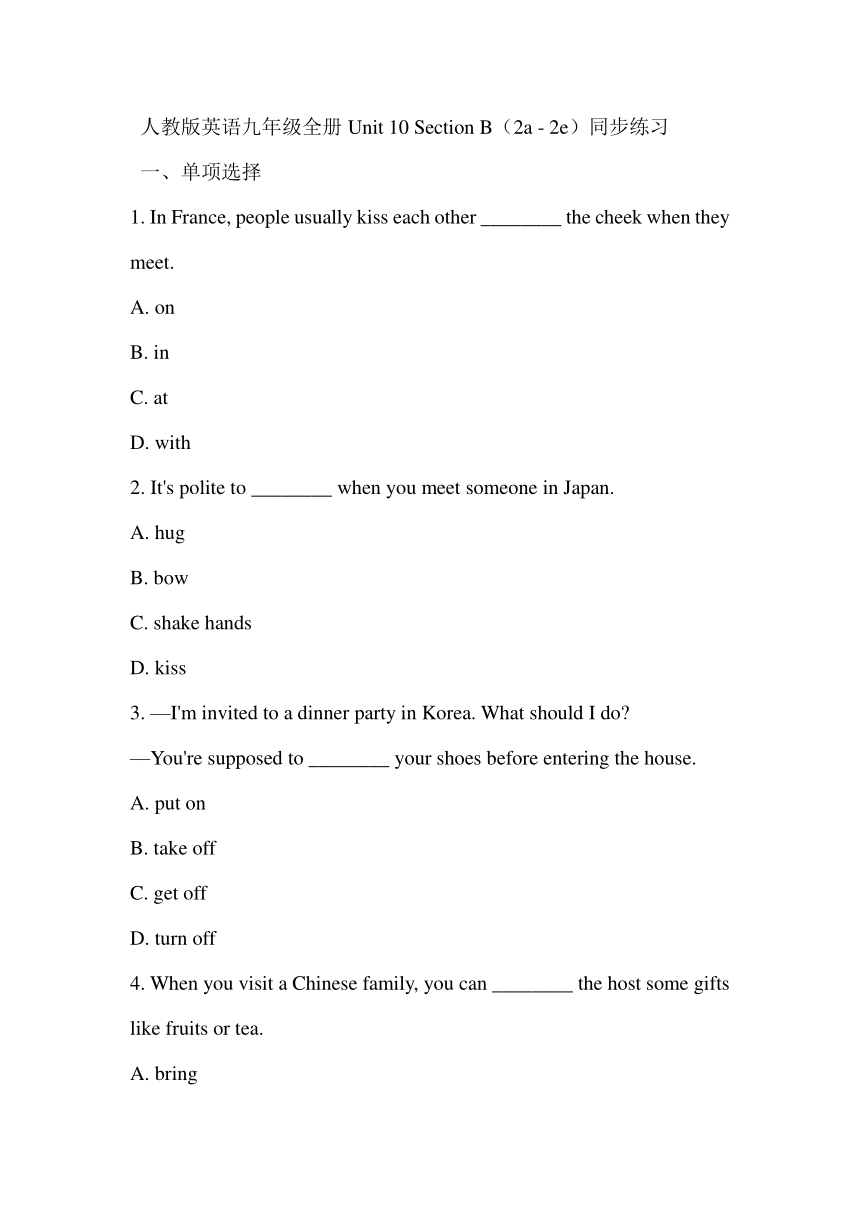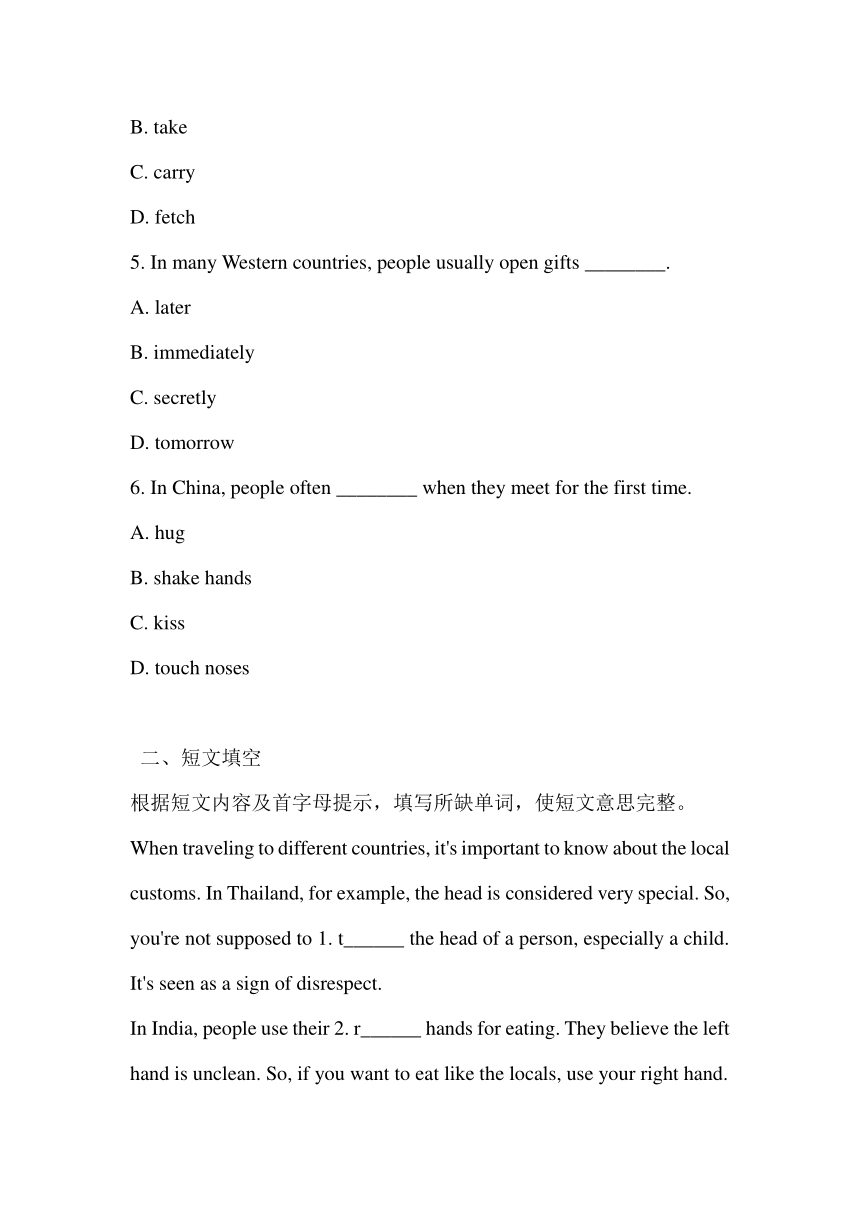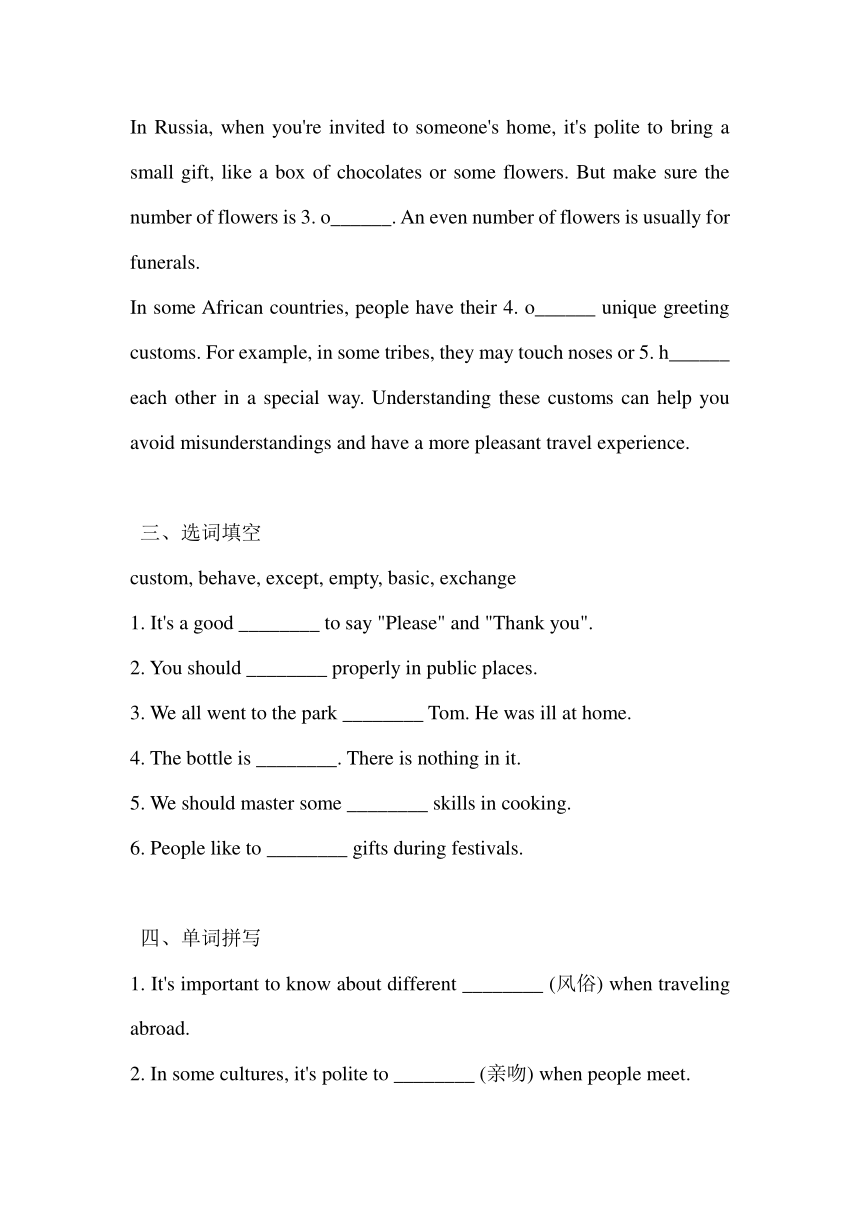Unit 10 You're supposed to shake hands. Section B(2a - 2e)同步练习(含解析)2024-2025学年人教版英语九年级全册
文档属性
| 名称 | Unit 10 You're supposed to shake hands. Section B(2a - 2e)同步练习(含解析)2024-2025学年人教版英语九年级全册 |  | |
| 格式 | docx | ||
| 文件大小 | 20.3KB | ||
| 资源类型 | 教案 | ||
| 版本资源 | 人教新目标(Go for it)版 | ||
| 科目 | 英语 | ||
| 更新时间 | 2025-03-05 13:00:19 | ||
图片预览



文档简介
人教版英语九年级全册Unit 10 Section B(2a - 2e)同步练习
一、单项选择
1. In France, people usually kiss each other ________ the cheek when they meet.
A. on
B. in
C. at
D. with
2. It's polite to ________ when you meet someone in Japan.
A. hug
B. bow
C. shake hands
D. kiss
3. —I'm invited to a dinner party in Korea. What should I do
—You're supposed to ________ your shoes before entering the house.
A. put on
B. take off
C. get off
D. turn off
4. When you visit a Chinese family, you can ________ the host some gifts like fruits or tea.
A. bring
B. take
C. carry
D. fetch
5. In many Western countries, people usually open gifts ________.
A. later
B. immediately
C. secretly
D. tomorrow
6. In China, people often ________ when they meet for the first time.
A. hug
B. shake hands
C. kiss
D. touch noses
二、短文填空
根据短文内容及首字母提示,填写所缺单词,使短文意思完整。
When traveling to different countries, it's important to know about the local customs. In Thailand, for example, the head is considered very special. So, you're not supposed to 1. t______ the head of a person, especially a child. It's seen as a sign of disrespect.
In India, people use their 2. r______ hands for eating. They believe the left hand is unclean. So, if you want to eat like the locals, use your right hand.
In Russia, when you're invited to someone's home, it's polite to bring a small gift, like a box of chocolates or some flowers. But make sure the number of flowers is 3. o______. An even number of flowers is usually for funerals.
In some African countries, people have their 4. o______ unique greeting customs. For example, in some tribes, they may touch noses or 5. h______ each other in a special way. Understanding these customs can help you avoid misunderstandings and have a more pleasant travel experience.
三、选词填空
custom, behave, except, empty, basic, exchange
1. It's a good ________ to say "Please" and "Thank you".
2. You should ________ properly in public places.
3. We all went to the park ________ Tom. He was ill at home.
4. The bottle is ________. There is nothing in it.
5. We should master some ________ skills in cooking.
6. People like to ________ gifts during festivals.
四、单词拼写
1. It's important to know about different ________ (风俗) when traveling abroad.
2. In some cultures, it's polite to ________ (亲吻) when people meet.
3. You are supposed to ________ (摇晃) hands when you meet someone in the US.
4. Don't be ________ (生气的) with him. He didn't mean to do that.
五、完成句子
1. 在巴西,人们见面时通常互相亲吻。
In Brazil, people usually ________ each other when they meet.
2. 当你去别人家时,你应该先敲门。
When you visit someone's home, you're supposed to ________ ________ the door first.
3. 在我们国家,初次见面时人们应该握手。
In our country, people are supposed to ________ ________ when they meet for the first time.
4. 你不应该用筷子指着别人。
You're not supposed to ________ ________ others with your chopsticks.
参考答案
1. A。“kiss sb. on the cheek”表示“亲吻某人的脸颊”,是固定搭配,所以选A。
2. B。在日本见面时鞠躬是礼貌的,bow表示“鞠躬”,所以选B。
3. B。在韩国进入房子前应该脱鞋,take off表示“脱下”,所以选B。
4. A。去中国家庭拜访时可以给主人带些礼物,bring表示“带来”,强调从别处带到说话者所在处;take表示“带走”;carry表示“携带”,不强调方向;fetch表示“去取来” ,所以选A。
5. B。在许多西方国家,人们通常立刻打开礼物,immediately表示“立刻”,所以选B。
6. B。在中国人们初次见面经常握手,shake hands表示“握手”,所以选B。
7. 1. touch。在泰国不应该摸人的头,be supposed to do sth.的否定形式是be not supposed to do sth.,touch表示“触摸”,所以用原形。
2. right。在印度人们用右手吃饭,right表示“右边的”。
3. odd。在俄罗斯送花数量应该是奇数,odd表示“奇数的”。
4. own。一些非洲国家有他们自己独特的问候习俗,own表示“自己的”。
5. hug。在一些部落人们可能用特殊方式拥抱,hug表示“拥抱”,may后接动词原形。
8. 1. custom。说“请”和“谢谢”是个好习俗,custom表示“习俗”,用单数形式。
2. behave。在公共场所应该举止得体,behave表示“举止;表现”,should后接动词原形。
3. except。除了汤姆我们都去了公园,except表示“除了”。
4. empty。瓶子是空的,empty表示“空的”,作表语。
5. basic。我们应该掌握一些烹饪的基本技能,basic表示“基本的”,修饰名词skills。
6. exchange。人们喜欢在节日交换礼物,exchange表示“交换”,like to do sth.表示“喜欢做某事”。
9. 1. customs。“风俗”custom,这里表示不同的风俗,用复数形式。
2. kiss。“亲吻”kiss,be polite to do sth.表示“做某事是有礼貌的”,用动词原形。
3. shake。“摇晃”shake,be supposed to do sth.表示“应该做某事”,用动词原形。
4. angry。“生气的”angry,be angry with sb.表示“生某人的气”。
10. 1. kiss。根据汉语提示及usually可知用一般现在时,主语是复数,动词用原形。
2. knock at。“敲门”knock at,be supposed to do sth.表示“应该做某事”,用动词原形。
3. shake hands。“握手”shake hands,be supposed to do sth.表示“应该做某事”,用动词原形。
4. point at。“指着”point at,be not supposed to do sth.表示“不应该做某事”,用动词原形。
一、单项选择
1. In France, people usually kiss each other ________ the cheek when they meet.
A. on
B. in
C. at
D. with
2. It's polite to ________ when you meet someone in Japan.
A. hug
B. bow
C. shake hands
D. kiss
3. —I'm invited to a dinner party in Korea. What should I do
—You're supposed to ________ your shoes before entering the house.
A. put on
B. take off
C. get off
D. turn off
4. When you visit a Chinese family, you can ________ the host some gifts like fruits or tea.
A. bring
B. take
C. carry
D. fetch
5. In many Western countries, people usually open gifts ________.
A. later
B. immediately
C. secretly
D. tomorrow
6. In China, people often ________ when they meet for the first time.
A. hug
B. shake hands
C. kiss
D. touch noses
二、短文填空
根据短文内容及首字母提示,填写所缺单词,使短文意思完整。
When traveling to different countries, it's important to know about the local customs. In Thailand, for example, the head is considered very special. So, you're not supposed to 1. t______ the head of a person, especially a child. It's seen as a sign of disrespect.
In India, people use their 2. r______ hands for eating. They believe the left hand is unclean. So, if you want to eat like the locals, use your right hand.
In Russia, when you're invited to someone's home, it's polite to bring a small gift, like a box of chocolates or some flowers. But make sure the number of flowers is 3. o______. An even number of flowers is usually for funerals.
In some African countries, people have their 4. o______ unique greeting customs. For example, in some tribes, they may touch noses or 5. h______ each other in a special way. Understanding these customs can help you avoid misunderstandings and have a more pleasant travel experience.
三、选词填空
custom, behave, except, empty, basic, exchange
1. It's a good ________ to say "Please" and "Thank you".
2. You should ________ properly in public places.
3. We all went to the park ________ Tom. He was ill at home.
4. The bottle is ________. There is nothing in it.
5. We should master some ________ skills in cooking.
6. People like to ________ gifts during festivals.
四、单词拼写
1. It's important to know about different ________ (风俗) when traveling abroad.
2. In some cultures, it's polite to ________ (亲吻) when people meet.
3. You are supposed to ________ (摇晃) hands when you meet someone in the US.
4. Don't be ________ (生气的) with him. He didn't mean to do that.
五、完成句子
1. 在巴西,人们见面时通常互相亲吻。
In Brazil, people usually ________ each other when they meet.
2. 当你去别人家时,你应该先敲门。
When you visit someone's home, you're supposed to ________ ________ the door first.
3. 在我们国家,初次见面时人们应该握手。
In our country, people are supposed to ________ ________ when they meet for the first time.
4. 你不应该用筷子指着别人。
You're not supposed to ________ ________ others with your chopsticks.
参考答案
1. A。“kiss sb. on the cheek”表示“亲吻某人的脸颊”,是固定搭配,所以选A。
2. B。在日本见面时鞠躬是礼貌的,bow表示“鞠躬”,所以选B。
3. B。在韩国进入房子前应该脱鞋,take off表示“脱下”,所以选B。
4. A。去中国家庭拜访时可以给主人带些礼物,bring表示“带来”,强调从别处带到说话者所在处;take表示“带走”;carry表示“携带”,不强调方向;fetch表示“去取来” ,所以选A。
5. B。在许多西方国家,人们通常立刻打开礼物,immediately表示“立刻”,所以选B。
6. B。在中国人们初次见面经常握手,shake hands表示“握手”,所以选B。
7. 1. touch。在泰国不应该摸人的头,be supposed to do sth.的否定形式是be not supposed to do sth.,touch表示“触摸”,所以用原形。
2. right。在印度人们用右手吃饭,right表示“右边的”。
3. odd。在俄罗斯送花数量应该是奇数,odd表示“奇数的”。
4. own。一些非洲国家有他们自己独特的问候习俗,own表示“自己的”。
5. hug。在一些部落人们可能用特殊方式拥抱,hug表示“拥抱”,may后接动词原形。
8. 1. custom。说“请”和“谢谢”是个好习俗,custom表示“习俗”,用单数形式。
2. behave。在公共场所应该举止得体,behave表示“举止;表现”,should后接动词原形。
3. except。除了汤姆我们都去了公园,except表示“除了”。
4. empty。瓶子是空的,empty表示“空的”,作表语。
5. basic。我们应该掌握一些烹饪的基本技能,basic表示“基本的”,修饰名词skills。
6. exchange。人们喜欢在节日交换礼物,exchange表示“交换”,like to do sth.表示“喜欢做某事”。
9. 1. customs。“风俗”custom,这里表示不同的风俗,用复数形式。
2. kiss。“亲吻”kiss,be polite to do sth.表示“做某事是有礼貌的”,用动词原形。
3. shake。“摇晃”shake,be supposed to do sth.表示“应该做某事”,用动词原形。
4. angry。“生气的”angry,be angry with sb.表示“生某人的气”。
10. 1. kiss。根据汉语提示及usually可知用一般现在时,主语是复数,动词用原形。
2. knock at。“敲门”knock at,be supposed to do sth.表示“应该做某事”,用动词原形。
3. shake hands。“握手”shake hands,be supposed to do sth.表示“应该做某事”,用动词原形。
4. point at。“指着”point at,be not supposed to do sth.表示“不应该做某事”,用动词原形。
同课章节目录
- Unit 1 How can we become good learners.
- Section A
- Section B
- Unit 2 I think that mooncakes are delicious!
- Section A
- Section B
- Unit 3 Could you please tell me where the restroom
- Section A
- Section B
- Unit 4 I used to be afraid of the dark.
- Section A
- Section B
- Unit 5 What are the shirts made of?
- Section A
- Section B
- Review of Units 1-5
- Unit 6 When was it invented?
- Section A
- Section B
- Unit 7 Teenagers should be allowed to choose their
- Section A
- Section B
- Unit 8 It must belong to Carla.
- Section A
- Section B
- Unit 9 I like music that I can dance to.
- Section A
- Section B
- Unit 10 You're supposed to shake hands.
- Section A
- Section B
- Review of Units 6-10
- Unit 11 Sad movies make me cry.
- Section A
- Section B
- Unit 12 Life is full of the unexpected
- Section A
- Section B
- Unit 13 We're trying to save the earth!
- Section A
- Section B
- Unit 14 I remember meeting all of you in Grade 7.
- Section A
- Section B
- Review of Units 11-14
